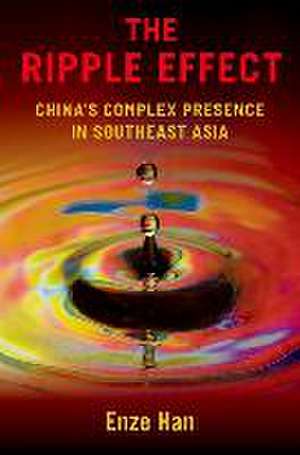The Ripple Effect: China's Complex Presence in Southeast Asia
Autor Enze Hanen Limba Engleză Paperback – 19 iun 2024
Preț: 127.48 lei
Preț vechi: 146.72 lei
-13% Nou
Puncte Express: 191
Preț estimativ în valută:
24.40€ • 25.34$ • 20.27£
24.40€ • 25.34$ • 20.27£
Carte disponibilă
Livrare economică 03-09 ianuarie 25
Livrare express 28 decembrie 24 - 03 ianuarie 25 pentru 42.30 lei
Preluare comenzi: 021 569.72.76
Specificații
ISBN-13: 9780197696590
ISBN-10: 0197696597
Pagini: 240
Dimensiuni: 160 x 226 x 25 mm
Greutate: 0.34 kg
Editura: Oxford University Press
Colecția OUP USA
Locul publicării:New York, United States
ISBN-10: 0197696597
Pagini: 240
Dimensiuni: 160 x 226 x 25 mm
Greutate: 0.34 kg
Editura: Oxford University Press
Colecția OUP USA
Locul publicării:New York, United States
Recenzii
In this insightful book, Enze Han effectively rejects the notion that China's influence in Southeast Asia is simply directed by a monolithic state. Han masterfully reveals the "complexity" of China's presence in the region, where unintended consequences and non-state actors are as much a part of the story as the intentions of Chinese leaders.
Based on extensive fieldwork, Enze Han offers a major contribution to our understanding of Chinese influence in Southeast Asia by bringing into the picture quasi-official, unofficial, and even illicit Chinese actors, examining indirect and unintended consequences, and shedding light on local interactions and resistances. The result is a complex, nuanced account that is a must-read for anyone seeking to understand China's engagement with the region.
Enze Han's The Ripple Effect is an important contribution to our understanding of China as a great power and the nature of its influence in Southeast Asia. Elegantly written, Han reveals the complex nature of China's influence across a set of issues, both traditional and non-traditional. Social scientists and international relations specialists will find Han's spotlight on the role of Chinese non-state actors in spreading Chinese influence and his use of the notion of unintended consequences to assess China's 'policies' invaluable.
In The Ripple Effect, Enze Han argues against the state-centric approach and focuses on the complexity of state-society relations to understand the increasingly globalized China and its influence on Southeast Asia. This book is a must-read for scholars and students of China and Southeast Asian studies.
Enze Han has written an outstanding book on the unintended consequences of actions by the Chinese state and non-state actors in Southeast Asia. An important contribution to a growing demand for assessments that center local actors and agency in shaping China's external footprint.
Thematically imaginative and empirically illuminating, The Ripple Effect unpacks the complex nuances behind China's ubiquitous but ambivalent presence in Southeast Asia. Enze Han masterfully reminds us that while size does matter and historical memories are always complicated among neighbors, the effects of asymmetry and proximity are rarely straightforward, but ambiguous, multifaceted, and uncertain. Intended or not, China's action and interactions with smaller neighbors at state, sub-national, or societal levels are bound to affect their present and future ties. This book is a must-read for those interested in understanding China-Southeast Asia relations and the paradoxes of influence in international politics.
Based on extensive fieldwork, Enze Han offers a major contribution to our understanding of Chinese influence in Southeast Asia by bringing into the picture quasi-official, unofficial, and even illicit Chinese actors, examining indirect and unintended consequences, and shedding light on local interactions and resistances. The result is a complex, nuanced account that is a must-read for anyone seeking to understand China's engagement with the region.
Enze Han's The Ripple Effect is an important contribution to our understanding of China as a great power and the nature of its influence in Southeast Asia. Elegantly written, Han reveals the complex nature of China's influence across a set of issues, both traditional and non-traditional. Social scientists and international relations specialists will find Han's spotlight on the role of Chinese non-state actors in spreading Chinese influence and his use of the notion of unintended consequences to assess China's 'policies' invaluable.
In The Ripple Effect, Enze Han argues against the state-centric approach and focuses on the complexity of state-society relations to understand the increasingly globalized China and its influence on Southeast Asia. This book is a must-read for scholars and students of China and Southeast Asian studies.
Enze Han has written an outstanding book on the unintended consequences of actions by the Chinese state and non-state actors in Southeast Asia. An important contribution to a growing demand for assessments that center local actors and agency in shaping China's external footprint.
Thematically imaginative and empirically illuminating, The Ripple Effect unpacks the complex nuances behind China's ubiquitous but ambivalent presence in Southeast Asia. Enze Han masterfully reminds us that while size does matter and historical memories are always complicated among neighbors, the effects of asymmetry and proximity are rarely straightforward, but ambiguous, multifaceted, and uncertain. Intended or not, China's action and interactions with smaller neighbors at state, sub-national, or societal levels are bound to affect their present and future ties. This book is a must-read for those interested in understanding China-Southeast Asia relations and the paradoxes of influence in international politics.
Notă biografică
Enze Han is Associate Professor in the Department of Politics and Public Administration at the University of Hong Kong. He is the author of Asymmetrical Neighbors: Borderland State Building between China and Southeast Asia and Contestation and Adaptation: The Politics of National Identity in China. During 2015-2016, he was a Friends Founders' Circle Member of the School of Social Science at the Institute for Advanced Study in Princeton, United States. He was also the Distinguished Fellow on Contemporary Southeast Asia by the Lee Kong Chian NUS-Stanford Initiative on Southeast Asia in 2021.
